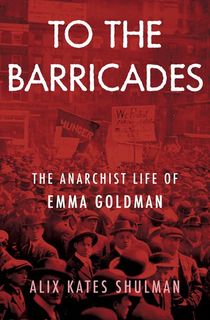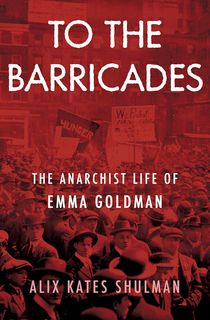On the day of the demonstration, four thousand people gathered to march on Union Square. Leading the march were the unemployed women, and at the head of the women was Emma. She was carrying a bright red flag, the banner of labor and the symbol of revolution.
When everyone had squeezed into Union Square the speeches began. One man spoke of the need for the government to create jobs; another demanded that the government distribute food. Their demands seemed absurd to Emma. Didn’t everyone know that the state legislature had already refused to create more than token jobs or distribute more than token amounts of food? Emma was scheduled to speak last. She would tell the jobless how useless it was to petition the government; she would tell them that their only hope was to take direct action.
At last it was Emma’s turn. Everyone began shouting, “Emma Goldman, Emma Goldman, Emma Goldman!”
She stepped forward, her temples throbbing and her knees trembling, and began one of those magically moving speeches for which she had already grown famous on the East Coast. She told the mob how absurd it was to expect relief from the government, the very “pillar of capitalism.”
Related: 20 Influential Women in History You Need to Know About
“Do you not see the stupidity of asking relief from Albany with immense wealth within a stone’s throw from here?” She told them they had a right to share in their rich neighbor’s bread if they themselves had none. Even the eminent Cardinal Manning had said as much. “Your neighbors,” Emma said, “will go on robbing you, your children, and your children’s children, unless you wake up, unless you become daring enough to demand your rights. Well, then, demonstrate before the palaces of the rich, demand work. If they do not give you work, demand bread. If they deny you both, take bread. It is your sacred right!”
The crowd received the speech with deafening applause. The next day the newspapers reported that “Red Emma” had urged the mob to revolution. The police, some said, must stop her.
Emma quickly left New York for Philadelphia. The police were right behind her. As she was about to deliver another speech, she was arrested and thrown into a Philadelphia jail until she could be transferred to New York. The charge was inciting to riot in Union Square, though no riot had ever occurred.

She was taken back to New York on a train by a Detective Jacobs of the New York City Police. He was extremely nice to her. He ordered a good dinner to be served to her in her car.
Over dinner he talked to her at length, complimenting her on her youth and her brilliance. How sorry he was, he said, that her talent would all be wasted in prison.
Emma was suspicious. “What’s on your mind?” she asked.
Detective Jacobs came straight to the point. The chief of police in New York would drop the charges against her and pay her a handsome fee, he said, if she would work with him. All she would have to do was report now and then on the activities of the radicals she knew.
Emma couldn’t believe it. Was this man really trying to bribe her to become a police spy? Could he really think she would betray her friends and herself? She snatched up a glass of ice water from her dinner tray and dashed it in Detective Jacobs’ face, oblivious of his power to harm her.
The next morning she was taken before the chief of police himself. He was enraged that she had refused his offer. He threatened to have her locked away for years. But Emma was someone who simply did not scare. Instead, she made her own threats, promising to expose to the whole country the corruption of the New York City Police Department.
The chief picked up a chair to throw at her—then changed his mind. Clearly, this small, vigorous woman was impervious to threats. She would have to be handled in some other way. He called a guard to return her to her cell in the city jail known as the Tombs. There she waited to be bailed out by her friends.
“I’ll take prison for life,” she said contemptuously, “but no one will ever buy me!”
While she waited in the Tombs, a well-known reporter of the day, Nellie Bly, came to interview her. Emma’s case was so sensational that the interview appeared on the front page of the New York World. As usual with articles about anarchists, the interview centered on the aspects of anarchism most outrageous and fascinating to the public—the anarchists’ rejection of society’s pet institutions of religion, the State, marriage. “I believe in the marriage of the affections. That is the only true marriage,” Emma replied plainly to a question, and the next day all New York twittered. The reporter touched on other things: on love and cleanliness, on terrorism and revolution. To her surprise, Nellie Bly found Emma no wild terrorist or seductress but a pretty, intelligent woman without a trace of frivolity. “She sacrifices her looks for books,” wrote Nellie Bly, amazed. She reported Emma to be an honest and dedicated woman whose opinions, if they were strange or shocking, were at least absolutely sincere.
Sincerely held or not, it was chiefly for her shocking opinions that she was convicted at her trial. The prosecuting attorney found her views no less titillating than did the newspaper-reading public. He questioned her repeatedly about them. He seemed to think that if the jury found Emma’s opinions wicked enough they would find her guilty too—whether or not her Union Square speech had incited anyone to riot.
Unlike Sasha, Emma accepted the services of a lawyer. An ex-mayor of New York, her lawyer, A. Oakey Hall, took the case free of charge. He expected to make a comeback into politics through the publicity the case would bring him. But not even he could keep questions about Emma’s beliefs out of the trial, though such questions were clearly out of order.
Related: Ruth Gruber: The Making of a Trailblazing Female Correspondent
The chief witness against Emma was the very Detective Jacobs who had tried to bribe her on the train from Philadelphia. He testified that he had written down Emma’s Union Square speech word for word (though he was no stenographer) and that in it she had urged the crowd to riot. When even the judge announced before the jury that Emma was a “dangerous woman in her doctrines,” no one doubted that the jury would find her guilty. Emma told a reporter that she would surely get a year of prison, “not because my offense deserves it, but because I am an anarchist.”
She predicted her sentence correctly. After the jury pronounced her guilty, the judge sentenced her to one year in Blackwell’s Island Penitentiary. Surrounded by police and reporters, she was taken from the court directly to the prison boat bound for Blackwell’s Island.
Emma was heading for a grim year perhaps the grimmest of her life. Yet she managed to appear brave and in high spirits. “Don’t write any more lies than you can help,” she called jovially back to the reporters as she boarded the prison boat.
Everyone laughed. “You can’t squelch that kid,” said one admiring reporter over and over. “You just can’t squelch that kid.”
Want to keep reading? Download To the Barricades by Alix Kates Shulman.
This post is sponsored by Open Road Media. Thank you for supporting our partners, who make it possible for The Archive to continue publishing the history stories you love.
All photos: Wikimedia Commons


